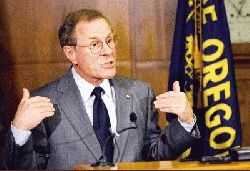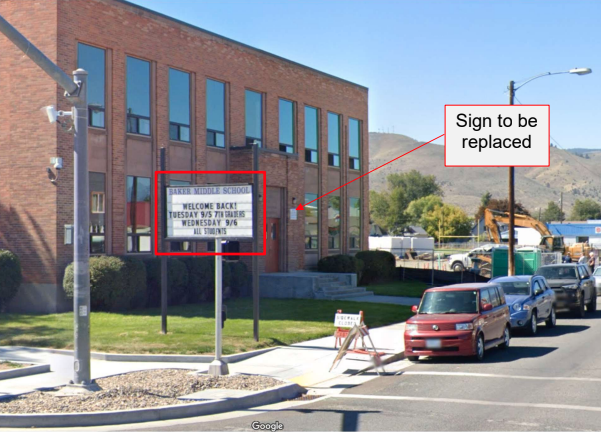Kulongoski outlines agenda for second term
Published 12:00 am Thursday, November 9, 2006

- Gov. Ted Kulongoski outlined his agenda for a second term at a press conference Wednesday. (WesCom News Service).
By JAMES SINKS
SALEM Fiscal reform. Universal health care. Election reform. Civil unions.
You can forgive some Oregon lawmakers for dreaming big in the aftermath of Tuesday’s elections, in which a progressive wave swept Democrats into control of the statehouse and also drowned a series of government-curbing ballot initiatives.
Gov. Ted Kulongoski easily won re-election and Democrats in the Oregon House picked up four seats, meaning that Demo-crats control both chambers of the Legislature and the governor’s office for the first time since the 1989 session.
The shift in the House means Republican incumbents from Central and Eastern Oregon all of whom were re-elected Tuesday will return to the Capitol with considerably less clout.
The state Senate was already under Democrat control. To some Democrats, the victory serves as a mandate and they say progressive issues such as civil unions for same-sex couples and tax reform will be figure more prominently on the radar in the 2007 session, which opens Jan. 8.
andquot;This is an opportunity for bold thinking and bold vision,andquot; said Sen. Kurt Schrader, D-Canby, who is part of a bipartisan group who is hammering out a proposal that would reduce income and property tax rates and institute a sales tax. andquot;Voters delivered, and now we should deliver too.andquot;
Yet less than a day after the polls closed, it was clear that Democratic leaders while thrilled with the new power structure at the Capitol will be preaching pragmatism.
After all, even though Democrats will lead the House, they have only the barest of majorities at 31 to 29.
But any revenue-raising measures must receive a three-fifths majority, or 36 votes.
So that means Republicans will still decide the fate of any revenue-raising proposals including several touted by the governor.
The difference in 2007: House Democrats will now decide which bills come up for votes, and which proposals die in committees.
In his first post-election press conference, Kulongoski on Wednesday said he’s optimistic about the possibilities in a Democratic-led Capitol and in a state that’s recovered from the recession that greeted him in his first term.
andquot;The last four years were tough, but the next four will be very good for Oregon,andquot; he predicted.
Kulongoski said his wide re-election victory despite being outspent showed that his campaign messages resonated with Oregonians.
Still, he kept his focus primarily on his campaign themes of creating an education plan that sends 61 percent of revenue to schools and colleges, a cigarette tax hike for children’s health care and spurring alternative energy.
andquot;It is not just Democrats in the Legislature,andquot; he said. andquot;We have to work with Republicans and get them involved.andquot;
He wants to raise the corporate minimum tax to pay for more pre-kindergarten and to create a surcharge on auto insurance to help pay for Oregon State Police patrols.
He also said government won’t lose sight of the goal to run as efficiently as possible. His office is writing the proposed state budget, which will be presented to lawmakers on Dec. 1.
Kulongoski said he won’t be leading the charge for more ambitious proposals such as tax reform or to radically rewrite the state’s kicker rebate law.
State Rep. Chuck Burley, R-Bend, said Republicans in the House will be willing to work with Democrats but won’t simply rubber-stamp any revenue-raising proposals that come rolling through.
For instance, he doesn’t sense much support for tacking a tax onto insurance bills.
andquot;We haven’t seen his full agenda yet, but I can’t see there being much support in the Republican caucus for doing that, and there wasn’t much support last time for raising the corporate minimums.andquot;
Senate Minority Leader Ted Ferrioli, R-John Day, said Democrats in the House have had their policy ideas suppressed for more than a decade and that will lead to an avalanche of pent-up bills, some of which might be too liberal for Oregonians’ tastes.
andquot;They say they don’t want to exchange one extreme for another, but I don’t know if they will be able to control themselves,andquot; he said.
andquot;The cork is out of the bottle and we’ll see how it pops. The interesting part of whole equation will be: Can they avoid overreaching?andquot;
Leadership changes in the House
Now that the elections are in the rearview mirror, attention turns to the leadership of House and whose fortunes will rise and fall.
House Democratic Leader Jeff Merkley, D-Portland, who helped engineer the Democratic takeover, figures to become the new House Speaker-elect when his colleagues meet on Sunday.
Current Speaker Karen Minnis, R-Wood Village, who was almost unseated on Tuesday, and House Majority Leader Wayne Scott, R-Canby, could have a tough time holding onto leadership positions within their party which will have to adjust to being a minority.
Republicans will choose their leaders today.
In the Senate, where Democrats retained control, no changes are expected.
Senate President Peter Courtney, D-Salem, said Wednesday he hasn’t been informed of any potential challenges from within his party.
Members of the controlling party choose not just the presiding officer, but they decide who holds gavels as committee chairpersons, and ultimately choose which bills have the opportunity to advance.
In the 2005 session, House Speaker Minnis used that power to keep several bills from reaching the House floor, such as a proposals to create civil unions, to create a larger rainy day fund and a limit on the interest rates that can be charged by payday loan businesses.
Four eastside Republicans figure to lose committee chairmanships in 2007: Reps. Tom Butler, R-Ontario (Revenue); Patti Smith, R-Corbett (Agriculture and Natural Resources); George Gilman, R-Medford (Transportation) and John Dallum, The Dalles (Information Management and Technology).
All of the Republican incumbents were re-elected from districts on the east side of the Cascades, although Dallum did so narrowly in House District 59, which stretches from Madras and Black Butte Ranch to John Day in Eastern Oregon.
He beat Culver farmer Jim Gilbertson by about 200 votes, 50.5 percent to 49.5 percent as of 6:55 p.m. Wednesday.
Rep. Chuck Burley, R-Bend, defeated former Deschutes Democratic Party Chairman Phil Philiben, 55 percent to 44 percent, according to Wednesday night counts.
Rep. Gene Whisnant, R-Sunriver, survived a lively challenge from retired teacher and coach Bill A. Smith, 59 percent to 41 percent in District 53, which includes Redmond, Sisters and La Pine.
Gilman, whose district includes Crook County, was unopposed.
Courtney said nobody should expect Democrats to come in and jam an agenda down Republicans’ throats.
andquot;You can’t get crazy,andquot; he said. andquot;Democrats are not the only show in town. Just because you have a majority does not mean you can abuse that position.andquot;
He predicts the new Legislature will find a way to replace the dilapidated state mental hospital, to enact stronger ethics laws and pass modest revenue increases.
Democrats may have a long list of things they’d like government to do, but can’t be andquot;overly ambitious,andquot; he said.
Still, he said, the Democratic control is an opportunity that should not be squandered.
andquot;How much we can do and how fast we can do it, I can’t tell you, but the public expects substantial things to be done for Oregon.andquot;
Merkley said he isn’t trying to bridle any ambitious proposals at least initially but makes no promises about which if any will ultimately fly.
He said Oregonians are ready for conversations about making schools better and lowering health care costs for businesses and individuals.
andquot;There’s a saying that if you reach for the stars, at least you’re getting off your butt,andquot; he said. andquot;I have no problem with people putting forward big ideas.andquot;
State Sen. Ben Westlund, I-Tumalo, said the time has come to discuss several proposals including widening public health care, allowing independent voters a say in primary elections and reforming the state’s unstable tax structure.
Those were planks in Westlund’s independent campaign for governor, which he abandoned in August after determining he lacked enough support to win.
andquot;There will be agendas put forth by many people, myself included, that will be big in scope and have significant positive impacts for the citizens of Oregon.andquot;
Lawmakers will face a balancing act, however, he said.
They can’t be reckless and any changes must be vetted not just by partisans but all Oregonians. But they also mustn’t get trapped by planning for the next election.
andquot;The motivation to the Legislature is that it has got to become a more viable instrument of change, that is more capable of solving real problems,andquot; he said.
andquot;But you can bet that people are already sitting down, on both the Republican and Democratic side, and figuring out how they can position and posture to make themselves look good or the other party look bad and at the expense of good public policy,andquot; Westlund said.





